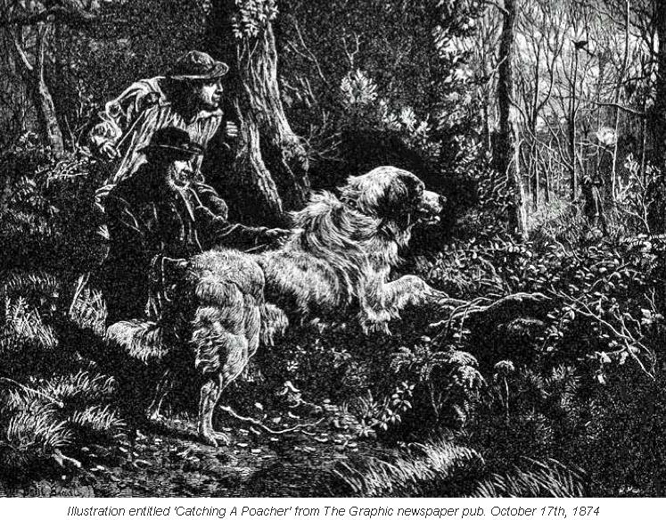Denied the right to hunt game in the forests of the rich; driven from enclosed land to the margins and struggling to get by; at the mercy of food shortages and price rises… Is it any wonder large numbers of the poor took to poaching? Many saw taking a deer from the lands of the wealthy as a right. And as the rich employed more and more keepers and guards to protect the game they occasionally hunted, the poachers increasingly went armed, and prepared to shoot back at keepers prepared to shoot or arrest them. At times in the eighteenth century, in the forests and parks, the struggle took on the character of a war. In the early 1720s, with a heavy economic depression hitting the poor hard, and resentment of the wealth of the landowning classes growing, the war over deer-stealing became headline news.
A succession of shootings led, in 1723, to a Parliament of the very wealthy passing the Black Act, the most draconian legislation ever brought in in England. The Act was so-named as its main measures were aimed at repressing the ‘Blacks’, armed poachers who went disguised with ‘blacked’ up faces to steal deer.
Under the Black Act, any offender who was armed and with a blacked face, armed and otherwise disguised, merely blacked, merely disguised, accessories after the fact or “any other person or persons” was found in a forest, chase, down or Royal Park, they could be sentenced to death. Similarly, it was an offence to hunt, kill, wound or steal deer in these locations, with the first offence punishable by a fine, and the second by penal transportation. Other criminalised activities included fishing, the hunting of hares, the destruction of fish-ponds, the destruction of trees and the killing of cattle in these locations – the latter also punishable by death. An offender could also be executed if he set fire to corn, hay, straw, wood, houses or barns, or shot another person. The same penalties applied to attempting to rescue anyone imprisoned under the Black Act, or attempting to solicit other people to participate in crimes that violated it. In total, the Act introduced the death penalty for over 50 criminal acts.
Around London Enfield Chase, Richmond Park, and to the west, Windsor Great Park, were among the main targets of the poachers. “They went into the park on foot, sometimes with a crossbow, and sometimes with a couple of dogs, being armed always, however, with pistols for their defence. When they had killed a buck, they trussed him up and put him upon their backs, and so walked off.”
Probably the first Londoner hanged under the Black Act was John Guy, from Teddington, then on the fringes of southwest London.
“JOHN GUY, of Teddington, was indicted for hunting and killing certain Fallow Deer, the Property of Anthony Duncomb, Esq ; in his Paddock or Pk, after the 1st of June, 1723,viz. on the 1st of September last. It appearing from the Evidence of Charles George the Keeper, and others, that this Prisoner and one Biddesford (who was killed in the Pursuit) were standing arm’d in the Park, and three Deer near them worry’d and kill’d; that in their flight they turn’d upon the Pursuers, and threaten’d to shoot them with their Pistols if they did not desist and leave them, together with other Circumstances, he was found guilty of the Indictment. But his Conviction was very much contrary to his Expectation; and after Sentence was pass’d upon him, tho’ he was far from denying his Guily, he was also far from believing he should suffer Death: So that altho’ he seemed to have a true and thorough Notion of Religion and of his Duty, he nevertheless appear’d Indolent and Remiss, till the Warrant for Execution left him no hopes that he should escape the Law. Before he died, he with many Tears lamented his Distress, and express’d the dangerous Condition of his Soul.”
(Newgate Ordinary’s Account, 30th April 1725.)
Guy’s companion named in this account, here called Biddisford, was probably John Berrisford, “Jack the Wheeler’, a London wheelwright, and famous deer-stealer, who had been ‘proclaimed’ under the Black Act in March 1724, after being involved in a fight with keepers on Enfield Chase. The account of Guy’s arrest may refer to an incursion into Richmond Park, in August 1724, when Jack the Wheeler was mortally wounded, and died in Kingston Gaol. Either that, or the affray in Duncombe’s lands took place on the same night.
Hangings such as Guy’s inflamed the hatred of the poachers; and of many also who supported them against the unjust and unequal laws that punished the poor on behalf of the rich. Keepers who arrested or identified poachers were assaulted, targeted, beaten up; there were attempts to kill them.
After a long campaign of legal reform, the Black Act was repealed in 1823.
The Story of the Black Act, and the poachers war against the keepers, can be read in EP Thompson’s ‘Whigs and Hunters’.
@@@@@@@@@@@@@@@@@@@@@@@@@@@@@@@
An entry in the 2016 London Rebel History Calendar – check it out online

Leave a comment